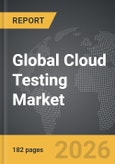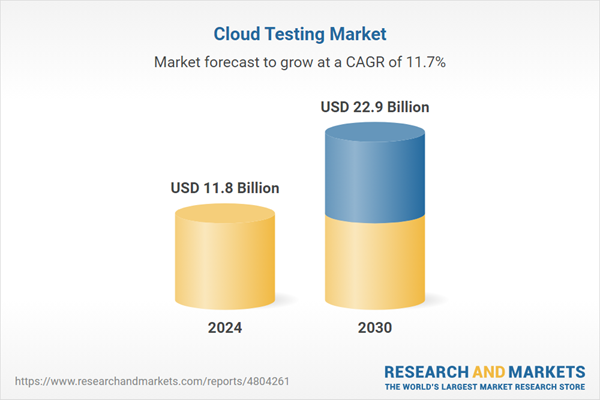Global Cloud Testing Market - Key Trends and Drivers Summarized
Why Is Cloud Testing the Future of Software Quality Assurance
Cloud testing is emerging as a transformative solution in the software quality assurance landscape, responding to the growing demands for faster, more efficient, and scalable testing processes. Traditional testing infrastructures often fall short in addressing the complexities of modern software development cycles, which are increasingly characterized by shorter timeframes, continuous integration, and the need for real-time feedback. Cloud testing enables businesses to test their applications on a massive scale without the need for physical infrastructure, allowing for on-demand access to testing environments. This capability has become crucial in today's globalized business environment, where applications must perform optimally across various regions, devices, and operating systems. The rise of DevOps methodologies and CI/CD pipelines has further accelerated the adoption of cloud testing, as these practices rely heavily on rapid, iterative testing to maintain quality and speed in software delivery. Moreover, the proliferation of mobile devices, IoT systems, and highly interconnected applications has increased the complexity of testing environments, necessitating the flexibility and scalability that only cloud-based testing platforms can offer.How Are Industry and Technology Trends Shaping the Cloud Testing Landscape?
The cloud testing landscape is being reshaped by a range of cutting-edge technologies and industry trends, which are revolutionizing how testing is conducted. Artificial intelligence (AI) and machine learning (ML) are at the forefront of this transformation, enabling more intelligent and automated testing processes. AI-powered tools can now generate test cases, detect bugs, and predict potential performance issues with unprecedented accuracy, reducing the reliance on manual testing and improving testing speed and outcomes. Additionally, the advent of containerization technologies like Docker and Kubernetes is allowing developers to replicate production-like environments for more accurate and consistent testing of applications. This capability is especially valuable for testing microservices architectures and distributed systems, which require multiple environments to interact seamlessly. Another key trend influencing cloud testing is the growing adoption of edge computing, particularly in industries that require low-latency solutions, such as autonomous vehicles, AR/VR applications, and healthcare. As more applications move to the edge, cloud testing must adapt to ensure that these distributed networks perform efficiently and securely. The convergence of AI, containerization, and edge computing is setting new benchmarks in cloud testing, enabling businesses to conduct more sophisticated, agile, and reliable testing processes.Why Are Enterprises Increasingly Opting for Cloud Testing?
The decision by enterprises to shift toward cloud testing is driven by several business and operational imperatives, chief among them being the need for scalability and flexibility in testing processes. In industries like e-commerce, finance, and media, customer demand is often unpredictable, leading to sudden surges in traffic during peak times, such as holiday shopping events or major sporting broadcasts. Cloud testing enables companies to simulate such conditions on-demand, ensuring their systems are robust enough to handle significant user loads without crashing. This ability to scale testing operations in real-time not only improves system reliability but also significantly reduces the costs associated with maintaining on-premise testing environments. The cloud's pay-as-you-go model makes it a financially viable option, allowing businesses to pay only for the resources they need, when they need them. Moreover, cloud testing platforms facilitate continuous testing across global data centers, ensuring that applications meet performance benchmarks no matter where users are located. As user experience becomes increasingly critical to business success, cloud testing helps companies ensure seamless, bug-free interactions across a wide array of devices, operating systems, and network conditions. Additionally, enterprises are adopting cloud testing as part of their broader move towards collaboration across geographically dispersed teams. The ability to access a centralized testing platform in the cloud allows for better coordination, faster iterations, and quicker release cycles, enhancing overall productivity and time to market.What Are the Key Drivers of Growth in the Cloud Testing Market?
The growth in the cloud testing market is driven by several factors, including the rapid adoption of DevOps practices, the need for faster time-to-market, and the increasing complexity of modern software applications. As businesses move toward agile development models, the demand for continuous testing increases, making cloud-based solutions essential for meeting these requirements. The integration of automated testing tools with cloud platforms further amplifies this demand, as automation is now a core component of modern software development. By leveraging cloud environments, automated testing can be deployed at scale, enabling faster, more efficient testing cycles. Additionally, consumer expectations for flawless digital experiences are forcing companies to adopt more sophisticated testing methods, as any glitch in performance can lead to significant customer dissatisfaction and loss of business. The expansion of 5G networks and the growth of IoT ecosystems are also creating new opportunities for cloud testing. These technologies introduce new layers of complexity in application performance and connectivity, which cloud testing platforms are uniquely equipped to handle. For industries such as healthcare, finance, and telecommunications, which operate under strict regulatory environments, cloud testing offers the security, compliance, and scalability required to meet both industry standards and consumer expectations. The ongoing digital transformation across sectors, further accelerated by the pandemic, has also intensified the shift toward cloud-native applications, thereby increasing the demand for cloud-based testing solutions. The need to maintain quality, security, and compliance at scale, particularly in a remote-working era, is a powerful driver of cloud testing adoption, making it a cornerstone of modern software development strategies.Report Scope
The report analyzes the Cloud Testing market, presented in terms of market value (USD). The analysis covers the key segments and geographic regions outlined below.- Segments: Component (Testing Tools / Platforms, Services); End-Use (Retail & eCommerce, IT & Telecom, BFSI, Media & Entertainment, Transportation, Other End-Uses).
- Geographic Regions/Countries: World; United States; Canada; Japan; China; Europe (France; Germany; Italy; United Kingdom; and Rest of Europe); Asia-Pacific; Rest of World.
Key Insights:
- Market Growth: Understand the significant growth trajectory of the Testing Tools / Platforms segment, which is expected to reach US$13.9 Billion by 2030 with a CAGR of 11.1%. The Services segment is also set to grow at 12.7% CAGR over the analysis period.
- Regional Analysis: Gain insights into the U.S. market, valued at $3.2 Billion in 2024, and China, forecasted to grow at an impressive 10.7% CAGR to reach $3.5 Billion by 2030. Discover growth trends in other key regions, including Japan, Canada, Germany, and the Asia-Pacific.
Why You Should Buy This Report:
- Detailed Market Analysis: Access a thorough analysis of the Global Cloud Testing Market, covering all major geographic regions and market segments.
- Competitive Insights: Get an overview of the competitive landscape, including the market presence of major players across different geographies.
- Future Trends and Drivers: Understand the key trends and drivers shaping the future of the Global Cloud Testing Market.
- Actionable Insights: Benefit from actionable insights that can help you identify new revenue opportunities and make strategic business decisions.
Key Questions Answered:
- How is the Global Cloud Testing Market expected to evolve by 2030?
- What are the main drivers and restraints affecting the market?
- Which market segments will grow the most over the forecast period?
- How will market shares for different regions and segments change by 2030?
- Who are the leading players in the market, and what are their prospects?
Report Features:
- Comprehensive Market Data: Independent analysis of annual sales and market forecasts in US$ Million from 2024 to 2030.
- In-Depth Regional Analysis: Detailed insights into key markets, including the U.S., China, Japan, Canada, Europe, Asia-Pacific, Latin America, Middle East, and Africa.
- Company Profiles: Coverage of players such as CA Technologies, Inc., Capgemini SE, Cavisson Systems, Inc., Cigniti Technologies Ltd., Cognizant Technology Solutions Corporation and more.
- Complimentary Updates: Receive free report updates for one year to keep you informed of the latest market developments.
Some of the 18 companies featured in this Cloud Testing market report include:
- CA Technologies, Inc.
- Capgemini SE
- Cavisson Systems, Inc.
- Cigniti Technologies Ltd.
- Cognizant Technology Solutions Corporation
- Cygnet Infotech Pvt. Ltd.
- IBM Corporation
- Micro Focus International PLC
- Neotys S.A.S
- Oracle Corporation
- SmartBear Software, Inc.
- Tricentis GmbH
- Xamarin, Inc.
This edition integrates the latest global trade and economic shifts into comprehensive market analysis. Key updates include:
- Tariff and Trade Impact: Insights into global tariff negotiations across 180+ countries, with analysis of supply chain turbulence, sourcing disruptions, and geographic realignment. Special focus on 2025 as a pivotal year for trade tensions, including updated perspectives on the Trump-era tariffs.
- Adjusted Forecasts and Analytics: Revised global and regional market forecasts through 2030, incorporating tariff effects, economic uncertainty, and structural changes in globalization. Includes historical analysis from 2015 to 2023.
- Strategic Market Dynamics: Evaluation of revised market prospects, regional outlooks, and key economic indicators such as population and urbanization trends.
- Innovation & Technology Trends: Latest developments in product and process innovation, emerging technologies, and key industry drivers shaping the competitive landscape.
- Competitive Intelligence: Updated global market share estimates for 2025, competitive positioning of major players (Strong/Active/Niche/Trivial), and refined focus on leading global brands and core players.
- Expert Insight & Commentary: Strategic analysis from economists, trade experts, and domain specialists to contextualize market shifts and identify emerging opportunities.
Table of Contents
Companies Mentioned (Partial List)
A selection of companies mentioned in this report includes, but is not limited to:
- CA Technologies, Inc.
- Capgemini SE
- Cavisson Systems, Inc.
- Cigniti Technologies Ltd.
- Cognizant Technology Solutions Corporation
- Cygnet Infotech Pvt. Ltd.
- IBM Corporation
- Micro Focus International PLC
- Neotys S.A.S
- Oracle Corporation
- SmartBear Software, Inc.
- Tricentis GmbH
- Xamarin, Inc.
Table Information
| Report Attribute | Details |
|---|---|
| No. of Pages | 182 |
| Published | January 2026 |
| Forecast Period | 2024 - 2030 |
| Estimated Market Value ( USD | $ 11.8 Billion |
| Forecasted Market Value ( USD | $ 22.9 Billion |
| Compound Annual Growth Rate | 11.7% |
| Regions Covered | Global |









